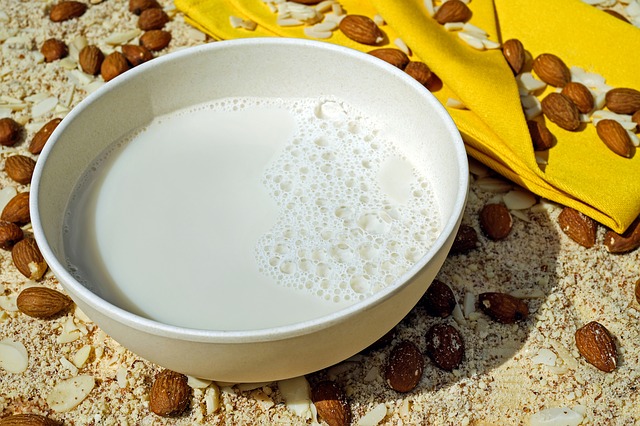Are You Being Tricked Into Thinking Almond Milk Is A Milk? You may be shocked to discover almond milk is classified as a juice. The same can be said for rice, coconut, hemp, potato or hemp ‘milks’. You may think it is harmless for your body to replace milk with the trendy alternatives but this is not always the case in all milk alternatives.
Firstly the protein content of milk is substantially more in one 250ml cup compared to most other milk alternatives. Milk has around 8g of protein, which is also a complete protein meaning it has all the essential amino acids of building blocks your body needs to make a protein. Compare this to soy which has slightly less at 7g and is also a complete protein.
The protein of a cup of alternative milk sources drops at a huge amount to 4g in one cup of hemp milk, 2g in a cup of grain milk which includes oat, quinoa, spelt and teff. Around 1g in a cup of almond, coconut or rice milk and almost nothing in a cup of potato milk. On top of this the protein in these milks is not complete meaning your body cannot make a protein simply by drinking this milk alone. You would need to add other complementary plant based proteins to completely obtain all the essential amino acids your body cannot make by itself to build a protein.
It may shock you to know that a single almond has around a quarter of a gram of protein. This means an entire cup only has around 4 almonds in total . What is often added to these milks is sugar and is why these milk substitutes are often classified as sugar sweetened beverages. This does not help your waistline and drinking excess calories is a quick way to lose your hard work in the gym and kitchen the rest of the week.
Milk is a great recovery drink, studies have shown milk can be even better than drinking a sports drink after a long gym session. Milk has many essential electrolytes and protein and carbohydrate to help you get your results. Some alternative milks like almond milk are often supplemented with calcium (look on the back for at least 100mg calcium per 100mls), vitamin D and B12. However these milk alternatives are often not supplemented with other beneficial components found in a glass of cow’s milk including vitamin A, magnesium, riboflavin, iodine, zinc and vitamin B6.
Take home message: Cow’s milk is a delicious drink which is what Dietitians call ‘nutrient dense.' If you have jumped on the milk alternative bandwagon have a check the ingredients to make sure your milk substitute closely matches the nutrition supplied to your body in a glass of cow's milk.
References:
- The Canadian Nutrient File. 2015. Available from: https://www.canada.ca/en/health-canada/services/food-nutrition/healthyeating/nutrient-data/canadian-nutrient-file-about-us.html?=undefined&
- Semba RD, Trehan I, Gonzalez-Freire M, Kraemer K, Moaddel R, Ordiz MI, Ferrucci L, Manary MJ. Perspective: The potential role of essential amino acids and the mechanistic target of rapamycin complex 1 (mTORC1) pathway in the pathogenesis of child stunting. Adv Nutr. 2016 Sep 15;7(5):853-65. Abstract available from: https://www.ncbi.nlm.nih.gov/pubmed/27633102
- Health Canada. Interim Policy on the Use of Expired Interim Marketing Authorizations Related to Food Fortification [cited 2017 Sep 4]. Available from: https://www.canada.ca/en/health-canada/services/food-nutrition/legislation-guidelines/policies/interimpolicy-on-use-expired-interim-marketing-authorizations-related-food-fortification.html#a61








